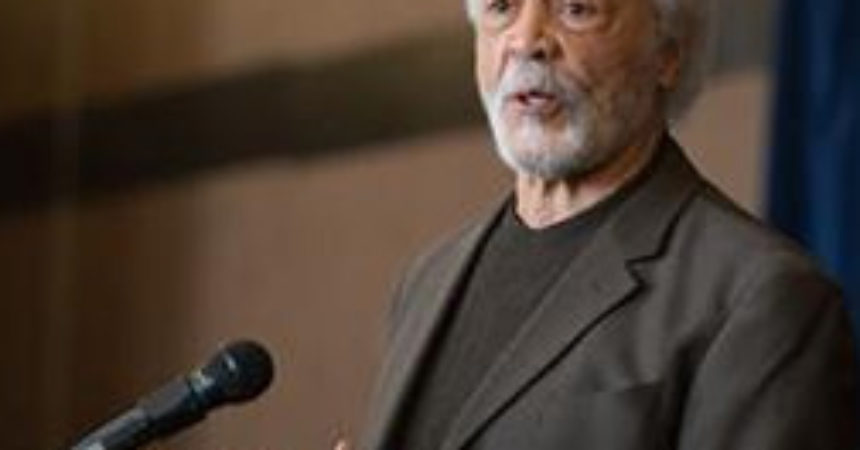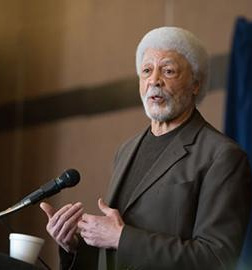
Congressman Ron Dellums –warrior and statesman -dies at 82

Former Congressman and Oakland Mayor Ron
Dellums. Photo courtesy of Trice Edney News Wire
By Hazel Trice Edney
Trice Edney News Wire
Former Democratic Congressman and Oakland Mayor Ron Dellums is being remembered this week as a warrior for justice, a statesman, and an advocate for the poor.
“The contributions that Congressman Dellums made to our East Bay community, the nation, and the world are too innumerable to count,” said in a prepared statement. California Congresswoman Barbara Lee, who succeeded Dellums when he left Congress in 1998 after 27 years. “I feel blessed to have called Congressman Dellums my dear friend, predecessor, and mentor. I will miss him tremendously, and I will hold dear to my heart the many lessons I learned from this great public servant…His legacy and spirit will be forever with us.”
Having served as a legislative assistant and chief of staff in his Washington, D. C. congressional office, Lee was elected to succeed Dellums when he resigned. Dellums reportedly died of cancer in his Washington, D.C. home. Looking back this week, Lee described him as “a warrior and a statesman”.
One of the 13 founding members of the Congressional Black Caucus, Dellums is perhaps best known for his fierce 14-year advocacy for the end of Apartheid in South Africa that included his sponsorship of legislation imposing sanctions against and divesting from the country in 1986. He served in Congress from 1971 until he resigned, citing personal difficulties. His stent included the chairmanship of the Congressional Black Caucus from 1989 to 1991.
Dellums also fought vehemently for civil rights, economic justice, health care, and social justice programs. He became known for his “alternative budgets” redirecting funds for jobs, education and anti-crime measures. As a member of Congress and as chairman of the House Armed Services Committee, he also advocated strongly against war.
He once said, “I have two things going for me. The first is the fidelity to my principles. And the other is my ability to show up for the fight every day. Period.”
Active in public service until he was too ill to do so, he served one term as Oakland’s 45th mayor and third Black mayor from 2007 to 2011. As news of his July 30 death began to spread this week, public statements were issued from other civil rights giants.
“Mr. Dellums was a relentless advocate for communities of color, low-income communities, civil rights and social justice; who did not shy away from issues just because they seemed controversial. He worked with Rep. Bennie Thompson to end apartheid in South Africa. He also served as the chairman of the Armed Forces Committee although he was an anti-war critic,” said NAACP Board Chairman Leon W. Russell. “Whether as an activist, Congressman or Mayor of Oakland, Ron Dellums created space for our voices to be heard. It is said that the current generation stands on the shoulders of giants, Ron was a giant who blazed a path to empowerment that we still walk on today.”
In his later years, Dellums continued his advocacy often times on paper, especially on health disparities. His opeds were often published in Black newspapers, including through the Trice Edney News Wire.
“Black History Month is an opportunity to reflect on how far America and the African American community has come, and how much more we have to accomplish. Consider the field of health care,” he wrote in a 2013 oped for the Trice Edney News Wire. “As the U.S. Department of Health & Human Services’ Office of Minority Health said last year, ‘Although Black people have continued to make strides and shape the United States, health rates on average for chronic diseases, infections and death have taken a toll on the population.’”
Upon his death, the National Collaborative for Health Equity (NCHE) released a statement describing him as a “tireless advocate for the needs of people of color and low-income communities, often challenging status quo systems of repression and marginalization.”
The NCHE also recalled that Dellums “called for the nation to embrace and value the lives of young people, and particularly young men of color who face persistent barriers to opportunity and inclusion. ‘If being an advocate of peace, justice, and humanity toward all human beings is radical,’” the NCHE quoted Dellums said, ‘“then I’m glad to be called radical.’”







